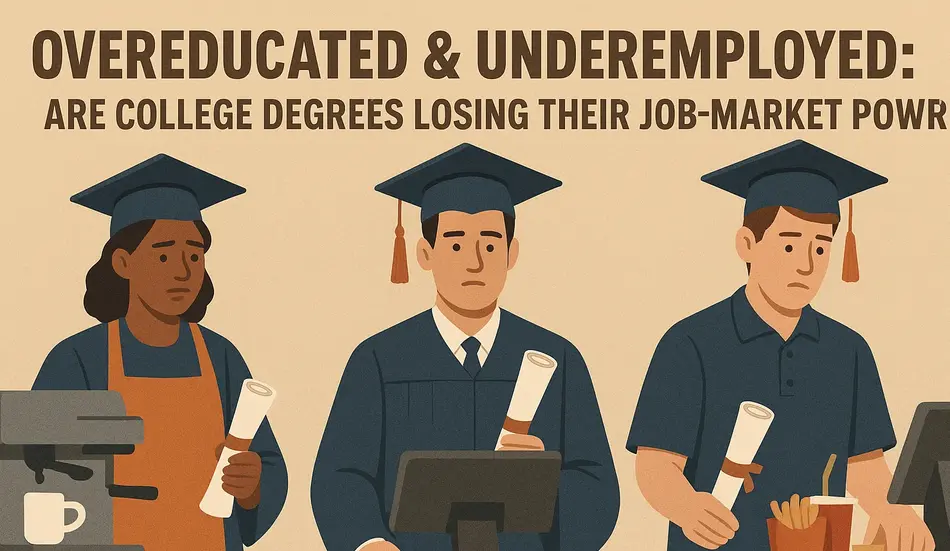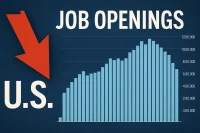Is college still worth it in an economy where graduates are increasingly overeducated and underemployed? Once hailed as the golden ticket to success, a college degree’s return on investment is being sharply questioned in 2025. Across the nation, Gen Z graduates are confronting a harsh job landscape marked by hiring freezes, AI-disrupted entry roles, and a surge in underemployment. These realities are fueling growing skepticism about the value of higher education and whether a degree still guarantees upward mobility.
A Tough Time to Graduate
Gen Z’s Disillusionment
Despite nearly 2 million bachelor’s degrees awarded in 2022–23, many fresh graduates struggle. The unemployment rate for college grads ages 22–27 has soared to 5.8%, significantly above both the national average and historical norms. Meanwhile, underemployment—working in roles that don’t require a degree—hits 41.2%, reflecting a crisis of misalignment.
White-Collar Careers on Pause
Entry-level hiring is down 17% since 2019, particularly in tech, finance, and government sectors. Late-stage degree seekers report heavier application loads and broader burnout—for many, college no longer ensures career access.
Underemployment: The Invisible Epidemic
Erosion of Entry-Level Roles
AI automation is eliminating traditional beginner roles—coding assistants, research aides, customer-service reps—only few companies now offer first-step opportunities. Instead, graduates pivot to gig, retail, or trade jobs—far from their career aims.
Fields Matter
While liberal arts grads face some of the highest underemployment rates (~50%), STEM degrees aren’t immune. Recent tech grads now see 6–7% unemployment, with degrees in social sciences exhibiting steadier job placement.
Degree vs. Skills: The Pivot Point
Credential Inflation is Real
What used to be jobs for high school grads now increasingly list bachelor’s degrees; and bachelor’s roles now ask for master’s. This escalating credentialism limits opportunity and exacerbates underemployment.
Skills Over Degrees
Emerging employer trends show over 80% of executives favor skills-first hiring—emphasizing real-world ability over diplomas. For AI, coding, and green jobs, skills can command wage premiums of 20–23%, outperforming degrees.

Institutional & Labor Market Dynamics
Post-Pandemic Slowdown
Government austerity, tech-sector chilling, and AI competition have collectively curtailed demand for junior roles.
Economic Lag & Inflation Risk
Youth unemployment among grads is up even as overall joblessness remains steady at 4.2%. This divergence could slow spending and prolong economic malaise.
Who’s Being Left Behind?
Recent Graduates
A record 5.8% unemployment among 22–27-year-old degree holders is a red flag—not seen since pandemic peaks.
Advanced-Degree Holders Too
MBA, Ph.D., and master’s degree holders are also struggling: long-term unemployment among them has quadrupled, hitting levels not seen since manufacturing collapses in the 2000s.
The Degree Skepticism Gap
About 49% of Gen Zers believe their degrees are losing relevance due to AI—a stark contrast to one-third of millennials.
The Economic Stakes
Underutilized Assets
With 50% of grads in jobs beneath their qualifications, the economy risks key talent misalignment.
Wealth Gaps
Although degree holders still earn nearly twice as much as high school graduates, underemployment erodes the payoff—and carries debt burdens.
Society-Wide Impacts
Credential inflation delays workforce entry, pushes some to trades, and impairs social mobility—particularly for low-income and first-generation students.
Adaptation Strategies
Students Can:
- Pursue micro‑credentials and skills certificates aligned with market demand.
- Focus on internships and project portfolios, not just traditional degrees.
- Explore trades and apprenticeships—many skilled manual jobs offer growth and stability.
Colleges & Universities Should:
- Embed stackable credentials and co-op models within degree programs.
- Partner with industry to ensure training fits job reality.
- Prioritize career advising over admission rates.
Employers & Policymakers Could:
- Implement skills-first hiring, reducing unnecessary degree filters.
- Support programs like ApprenticeshipUSA and vocational upskilling grants.
- Mandate transparency in job requirements, avoiding inflated degree demands.
Looking Ahead: Trends & Opportunities
AI Displacement & Creation
AI displaces routine graduate roles (like basic programming), but simultaneously spawns demand for AI-literate and hybrid tech-nontech roles.
Degree Still Matters—When Paired
Degrees combined with timely, role-specific certifications can still unlock opportunity. Modular upskilling is key.
Market Correction Potential
Some employers predict renewed entry-level hiring as AI disproportionately filters junior roles—creating long-term openings if talent pipelines are maintained.
🎓 Discover High-Value Jobs That Justify Your Degree
Wondering if college is still worth it? Make your education count.
Explore entry-level and graduate jobs that align with your qualifications and help you avoid underemployment.
At WhatJobs, we connect ambitious graduates with roles that offer real growth — not just a paycheck.
👉 Browse top graduate roles now and turn your degree into a career advantage.Final Take
The college degree hasn’t lost power—but its once-worldwide prestige is being redefined. In an age where AI reshapes both entry-level and advanced roles, degrees must be coupled with demonstrable skills and practical training.
Today’s college graduates must build hybrid profiles—education plus certifications, real-world experience, and AI competence. Institutions and employers must adapt as well—by focusing on outcomes, not titles. Only then can degrees pay off, equal opportunity flourish, and the promise of higher education remain intact in a rapidly evolving job market.
FAQs
Q: Are degrees worthless now?
A: Not at all. They still yield wage premiums—but only if paired with relevant skills and credentials tailored to job needs.
Q: What degree fields fare best today?
A: STEM still leads, but social sciences, humanities, and interdisciplinary degrees are proving more resilient amid rapid change.
Q: How can grads avoid underemployment?
A: Get job-ready through skills training, build portfolios, use internships, and apply for employers that value competencies over credentials.




